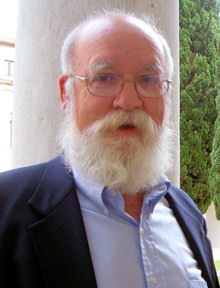 |
| Daniel Dennett |
I have read Dennett's article A Perfect and Beautiful Machine with interest and I feel his whole argument is based on a false
premise. Any mathematician knows that there are usually ways of
building alternative mathematical models – and you need to select a
model appropriate to the task in hand. Because Turing's model
explains the success of the stored program computer Dennett makes the
assumption that it must be the appropriate model for understanding
the working of the brain. But let us look at the model Turing started
with, as described by Dennett
“He took human computers as his model. There they sat at their desks, doing one simple step after another, checking their work, writing down the intermediate results instead of relying on their memories, consulting their recipes as often as they needed, turning what at first might appear a daunting task into a routine they could almost do in their sleep.”
Come on. Lets be realistic. Several
hundred generations ago we were all hunter gatherers and what is
being describe has absolutely nothing to do with the way the brain
evolved up till then, and there is no evidence that it has changed
significantly in the last 10,000 years or so. A room full of human
computers is a very artificial situation as only some people (not
everyone would be good at it) could carry out out a
highly repetitive and deadly boring task. To do it they have to behave like a zombie (because they could almost do it
in their sleep) to a recipe (because
they cannot be trusted to use their own initiative, so a recipe
“creator” had to tell them what to do). The task
is beyond their brains normal capacity (they
write down information because they cannot trust their memories).
In addition the overall effect of their labour is to carry out a
well-defined and highly formal task which is related to some very
narrow aspect of the culture of their society. Their activity is
totally directed – while the whole point of evolution is that it is
blind to the direction it is going. Put in this way it is hard to see
why anyone should think that Turing's “human computer model” has
anything to do with the environment in which the human brain
evolved.
If we are really honest we must admit
that the task that faced Turing was the design of systems which could
quickly and efficiently carry out highly repetitive computational
tasks, and he was employed to do this because humans could not carry out such tasks in a fast and reliable manner, even when given
extensive training and very precise instructions. The Turing model is
actually an extremely useful and powerful model of what humans cannot
naturally do!!!

No comments:
Post a Comment